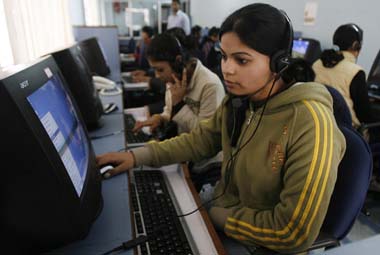New York: The anti-outsourcing lobby in the US fired a real zinger at countries like India and the Philippines that have been the preferred call-centre destinations for US companies. A bipartisan bill has been tabled in the House of Representatives that would punish American corporations for offshoring their telephone call centres, by making such companies ineligible for grants or guaranteed loans from the federal government.
More worryingly, the bill also seeks to give US consumers the right to ask where the call centre representative they are speaking with is located, and ask for an America-based representative instead.
Tim Bishop, a Democrat Congressman from New York, and Republican representative David McKinley introduced The US Call Center Worker and Consumer Protection Act, a bipartisan bill to clamp down on outsourcing. The proposed legislation has the potential to hurt India, which already holds at least 50 percent of the global outsourcing market, which includes call centres, number-crunching back offices and software development outlets.
[caption id=“attachment_148780” align=“alignright” width=“380” caption=“A bipartisan bill in the US Congress seeks to punish US companies that offshore call-centre jobs to India and the Philippines.Reuters”]  [/caption]
The Philippines now leads India in call-centre jobs, employing 350,000 compared with India’s 330,000, according to the Contact Center Association of the Philippines.
America’s protectionist legislation would put some aggressive mandates on call-centre operations. Here are some of the things this bill would do:
• Require the US Department of Labor to publicly list US firms that move call centre jobs overseas
• Make these firms ineligible for any direct or indirect federal loans or loan guarantees for five years
• Require 120-day advance notification of a proposed move offshore
• Require call centre employees to tell US consumers where they are located, if asked
• Require that call centres transfer calls to a US call centre, if asked
In a conference call with reporters, Bishop said: “Outsourcing is one of the scourges of our economy and one of the reasons we are struggling to knock down the unemployment rate and reduce the number of Americans who are out of work… We can’t prohibit it, but we can certainly discourage it.”
“With Representative McKinley as my primary Republican co-sponsor, I’m very hopeful he can bring a good number of his colleagues to the table,” Bishop said. “It’s hard to defend the practice. It’s hard to say we would rather employ someone in the Philippines or India than in the US.”
Not surprisingly, Bishop and McKinley’s call centre bill has powerful backing from the Communications Workers of America (CWA), a union representing 700,000 workers, more than 150,000 of whom are customer service reps.
“Americans are fed up with good-paying family supporting call center jobs here in the US being shipped overseas so the one percent can make a little extra money,” said CWA chief of staff Ron Collins, who will be mobilising support for the legislation in individual states and Congressional districts.
The call centre bill is unlikely to win the support of the large number of anti-protectionist Republican members of Congress, but it comes at a time when job creation is a top priority for Republicans and Democrats as the country heads into the 2012 election. As the election battle heats up, so will debates about unemployment, the sliding US economy, and inevitably, outsourcing.
Politicians of all stripes applauded when AT&T promised in August this year to bring 5,000 customer service jobs back to the US if it was allowed to proceed with its proposed $39 billion acquisition of T-Mobile USA. AT&T’s call centres in India and the Philippines were directly in the line of fire. Fortunately for the company’s Indian workers, AT&T abandoned its takeover bid for T-Mobile USA on Monday after opposition from telecom regulators, who baulked at AT&T’s ambitions to become the biggest US wireless carrier.


)
)
)
)
)
)
)
)
)



